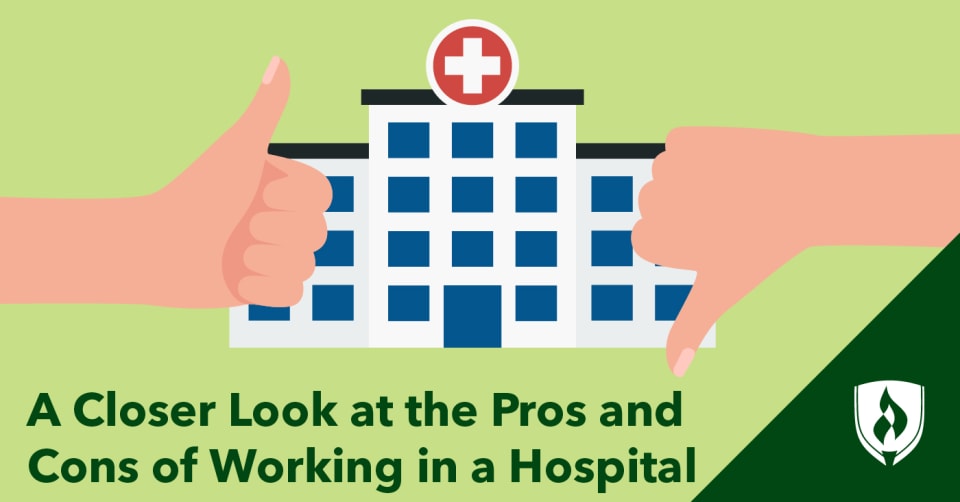
You’ve always had a penchant for helping others, and now that it’s time to choose a career, healthcare seems like a natural fit. After all, what’s not to like about a career that allows you to make a truly positive impact on the lives of others?
Of course, healthcare workers and the positive impact they bring can be found in a variety of settings. From doctor’s offices to outpatient clinics, you’ve probably thought about where you would work best. Does a big, bustling epicenter of medical care fit your style?
If you’re wondering whether working in a hospital is right for you, you’ve come to the right place. To help with that, we turned to the experts to give you an inside look at hospital life. Learn from their experience as we examine the pros and cons of working in a hospital and discover whether this fast-paced medical environment is right for you.
Contents
The advantages of working in a hospital
There’s a lot to love about working in a hospital. Here are some of the benefits you can expect.
A big team with big camaraderie
There’s a reason television and movies offer so many dramatizations of hospital settings. At its core, the hospital is a big place where people from various walks of life come together to work with one another.
“You build a sense of camaraderie in a hospital. Working a code to bring someone back to life tends to bring people together,” says Sean Marchese, registered nurse (RN) at The Mesothelioma Center. Marchese notes that one of the most unique things about his hospital experience was that even though everyone has vastly differing roles, they all have the same goal: save as many lives as possible.
“You really get the sense that you’re saving lives together every day, and the best team will always support each other at the drop of a hat.”
Job opportunity
Now is an especially great time to work in healthcare. The massive baby boomer population is reaching the age that tends to require more medical services, which should be a positive force for healthcare job security.
The Bureau of Labor Statistics projects the healthcare industry to add approximately 2.6 million new jobs by 2030, which is more than any other occupational group.1 This is key because hospitals are still the number one employer for many careers in the healthcare industry. As an example, 61 percent of nurses are employed by hospitals.1
Another benefit to the hospital setting is that there’s an opportunity for career change within a single facility—whether that’s the nursing assistant who makes the transition into a registered nursing role or the medical/surgical nurse transitioning into a specialized neonatal intensive care unit position. Having a foot in the door and familiarity with an organization of highly varied healthcare positions certainly doesn’t hurt for anyone who may want to explore new roles.
Competitive pay
Depending on your location, experience and specific role, you might find more lucrative opportunities with hospitals competing for the strongest candidates in each field. “The pay in hospitals is much more competitive than private practice for physical therapists,” says Caleb Gray, physical therapist at Click Physiotherapy.
While talking about pay in any location, there are always going to be countless variables to take into consideration. But by once again using nursing as an example, the BLS reports that the 2020 median annual salary for nurses working in hospitals was higher than those working in ambulatory centers or residential care facilities.1
Fast-paced work environment
If you are the kind of person who thrives with new and exciting challenges, the hospital is the place for you. “During a single shift in a hospital, you may have patients ranging from minor injury to severe and acute disease, so you really could walk into anything each day,” Marchese says. Add in the realities of an emergency department, people giving birth, operating rooms and beyond, and you’ll see why the hospital is a place for people who thrive in the midst of a controlled chaos.
Coffee shops and other amenities on site
While it’s not guaranteed at all hospital locations, amenities like on-site coffee shops, cafeterias, pharmacies and childcare centers are often found in (or very close nearby to) a high-density hospital setting. While this might be a relatively small factor, sometimes these little things can add up and really have an effect on your overall happiness—good coffee has helped plenty of healthcare providers power through a long day.
More opportunities to form relationships
One common theme that healthcare professionals in hospitals mention is their experience with all the people in their hospital setting, whether that’s patients or coworkers. While this of course happens in smaller care settings, the large-scale setting of a hospital allows for the development of more relationships.
“Hospitals are much bigger than private organizations, and as such, you have the opportunity to connect with many more people,” Gray says. “If I were to leave, that is something I would greatly miss!”
The disadvantages of working in a hospital
Similar to most work environments, there are a few drawbacks to working in a hospital setting. Here are a few of the less-than-ideal aspects you should be aware of.
Acuity of care for patients
The reality of working in larger hospitals is that they are busy, and you won’t be able to dedicate all your time to one patient. Marchese notes this difference between private practice and working in a hospital—a work environment where you have to quickly go back and forth between numerous patients.
“In a hospital setting, nurses are always watching patients and check on them at least every half hour. It becomes an exercise of balancing patient health and safety rather than addressing a simple concern.”
Healthcare workers in hospitals have the opportunity to work with many patients, but that high acuity often means they have less time to build relationships with each individual.
More administrative standards and bureaucracy
Out of necessity, hospitals have very specific rules and regulations for their day-to-day operation. Gray notes that this can be difficult for those who want to innovate or generally bristle at rigid procedures—particularly if you’re not in a position with the authority to make changes. “It is very hard to get new ideas off the ground as there are so many processes you need to follow. Sometimes it’s easier just to go with the flow and not try to implement new things.”
A nontraditional schedule
Since many hospitals stay open 24/7, shifts and time on call might include irregular hours, holidays and everything in between.
In private practice settings, Marchese notes that it is uncommon to be on call in a way that would interrupt his established schedule. In a hospital, employees can be on call “any time there’s a staff shortage or an influx of patients or any number of other reasons.” A hospital schedule does not offer the same scheduling consistency that you might see at other healthcare locations.
The daily commute
Many bigger hospitals are located in densely populated areas. This can make the daily commute more complicated than other locations as Marchese explains. “Commuting to a hospital in a big city can be nerve-racking. Traffic and lack of parking can cause significant delays, leading to a missed report from other nurses and a tough start to your shift.”
Depending on where you live and the local transit options, the more-populated environment may not be an issue. But for those who live further away, traffic, weather issues and parking can be a real stressor.
Is working in a hospital for you?
Hospitals are a focal point of healthcare, but does working in a hospital match your interests and goals? No job will be 100 percent perfect, and you may be hesitant about many different factors in any work environment. But these pros and cons of working in a hospital can help you decide if you want to seek employment in a hospital or in another type of healthcare facility.
Either way, a career in healthcare can look so different from person to person. There are roles, work settings and education paths to fit any interest. Check out our article “Exploring 12 Healthcare Jobs You Can Launch in 2 Years or Less” to learn more about some of the top options for getting started in this field sooner rather than later.
[“source=rasmussen”]

